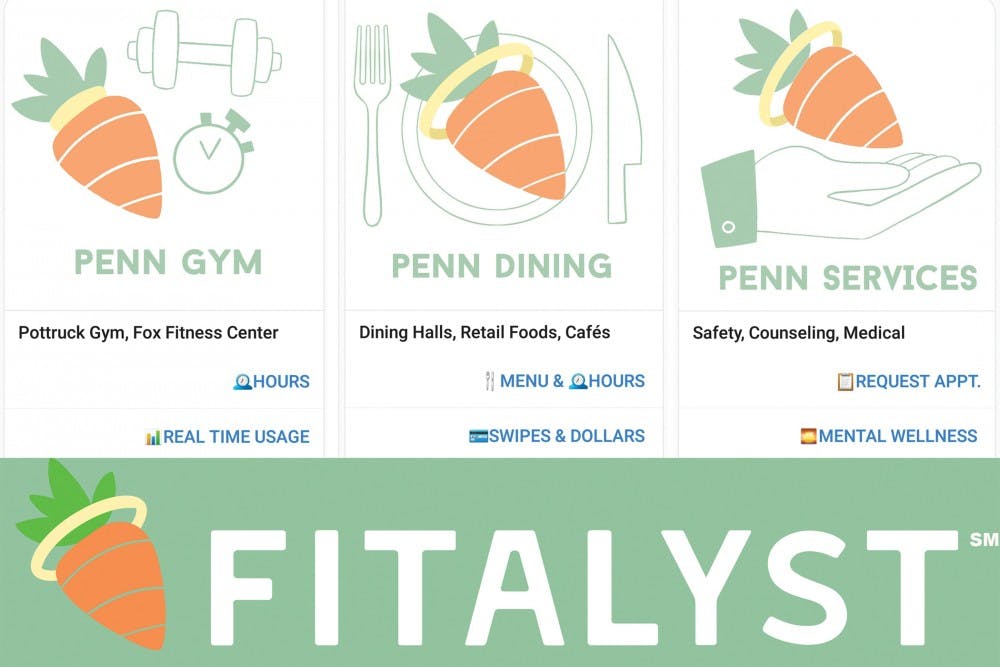For Quakers struggling to fit healthy habits into their lives, three Penn students have created a motivating and innovative application.
Perelman graduate student Jonathan Muruako, College senior Cameo Hazlewood, and College junior Michael Berk are the minds behind the tech startup Fitalyst, a program designed to promote a healthy lifestyle through a behavioral science approach. They employ a WIN-WIN wellness platform that benefits both the users, dubbed Health Seekers, as well as the Wellness Businesses that exist to help the users reach their health goals.
The term Wellness Businesses includes gyms, recreational centers, grocery stores, restaurants, and other similar facilities. These businesses and their consumers comprise what Fitalyst’s creators have creatively termed the Health Ecosystem. Unlike the typical fitness tracker, it serves as a health platform that aggregates the expertise of various experts all in one place.
Co-creator Michael Berk said the motivation to be healthy is employed through a behavioral psychology approach. Muruako earned his undergraduate degree in Biological Basis of Behavior, and the team used this expertise to create motivational profiles for each user.
“With this approach we really want to be able to understand the student from a behavior standpoint; understand their schedules, understand their goals, even understanding their behavioral biases,” Muruako said.

The app is available via Facebook Messenger and features Tag, an online avatar designed to act as the user’s “healthy conscience.” Tag was created to help the user cultivate a healthy lifestyle and make the best choices in terms of eating well and getting exercise.
Tag’s features include providing the users with information about Wellness Businesses, weekly health challenges, and motivational statements tailored to fit the user’s needs, in an effort to hold them accountable and keep them driven.
Related:
Behavior Change for Good, led by Angela Duckworth, Katherine Milkman, receives $2 million boost
Penn Athletics names Dr. Andrea Wieland new Associate Athletic Director for Sports Performance
Tag also customizes its interaction with users, Berk said.
"[Tag] will talk to you and essentially get to know your personality, and if you need to be yelled at to go work out, Tag will say 'get off your ass and go work out," Berk said. "If you're more of a 'hey you're doing great today, let's go to the gym," it'll try to take that approach."
His inspiration for the app came from reflection about his own struggles with time management as a student at Penn.
“With Fitalyst, we want to simplify health decision-making for busy college students.”
Muruako stated that the company has reached out to various entities in the Health Ecosystem, such as Pottruck and Penn Dining “to really understand their problem from a student-focused standpoint…so students can better engage with those opportunities.”
Fitalyst is mutually beneficial for all members of the “Health Ecosystem,” including Wellness Businesses. According to the company’s website, Fitalyst teaches users how to better use the products and services offered by the numerous businesses. This dynamic offers the businesses verifiable data on the needs of consumers, while aiding the user in their journey to fitness.
Wharton freshman Emily Liu shared her thoughts on how Fitalyst can help the typical student. She stated “I think as a student you tend to spend a lot of time studying and you don’t have a lot of time for yourself, and so I think this app could… help me schedule a time to work out and have a healthier lifestyle.”
Liu then commented on the motivational aspects of Fitalyst, a component that she believes is not found in other similar apps.
Fitness apps are especially relevant as studies have shown a correlation between beginning college and gaining weight. According to a study published in the US National Library of Medicine, 77 percent of the participants gained weight during their freshman year of college, primarily in their first semester.
Fitalyst remains an independent company but is hoping to expand its reach through partnerships with Wellness Businesses. Berk developed both the prototype and the current version of the app, which has undergone one round of pilot testing with 100 users. They hope to recruit 1000 users for their second round of pilot testing.
The Fitalyst team is still in the process of refining certain aspects of the app through pilot testing so that it will better suit each individual’s needs.









